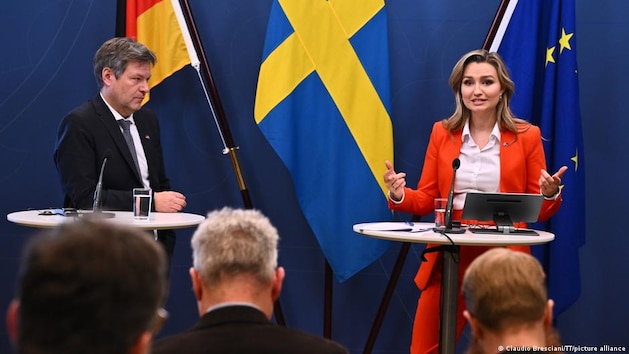The German Minister for Economic Affairs and Climate Protection, Robert Habeck, seems a bit tired. 2022 was a tough first year as Vice Chancellor and Minister in the so-called traffic light coalition of SPD, Greens and FDP. The war in Ukraine brought energy prices rising extremely quickly, and Germany broke away from its heavy dependence on Russian oil and gas at record speed. Habeck was dealing with this problem day and night, looking for alternatives to Russian supplies in Norway or Qatar, and had floating terminals built for liquid gas. And now, during a brief visit to Sweden, he reports how hard this journey was.
But Habeck also emphasizes that he was ultimately successful – or hopefully will be successful in the long term. In an interview with DW in Stockholm, Habeck said: “It is undisputed that we all pay a high price as a society. High inflation, high energy prices. And certainly there are also many fears and worries that are associated with it. But on the plus side, we’ve managed to do it without dramatic economic slumps. But maybe it’s still a bit early to say: We have averted the energy crisis.”
In Sweden’s capital, Habeck is now standing somewhat exhausted next to his Swedish colleague Ebba Busch, who has only been in office for a few months and is bursting with energy. The 35-year-old party leader of the Swedish Christian Democrats explains to Habeck in brilliant English that she took Habeck as an example when she was shaping her ministry. She is also responsible for industry, business and climate protection. And she is also deputy head of government, just like Habeck is vice chancellor in Berlin.
She has just made it clear that Sweden is also relying on nuclear energy on the way to climate neutrality, unlike Germany. And Habeck is right in the middle of his favorite topic, the German way into the climate future, without coal, without nuclear power, but with a lot of wind energy and solar power.
He actually started for this in December 2021, when the new government in Berlin started work. But at the time, no one could have guessed that the war would soon push every other topic into the background.
Nevertheless, Habeck is now talking to DW about the German way without coal and nuclear power: “Germany has actually always done very well with it when it had very ambitious plans. The expansion of renewable energies is really picking up. And for the phases when there is not enough renewable electricity, we need highly flexible power plants with large capacities. That’s why we need hydrogen power plants.” In any case, new nuclear power plants are usually much too expensive.
So there are now other topics than the aggression policy of Russian President Vladimir Putin – topics that concern both Sweden and Germany. The problem with the unwieldy name Inflation Reduction Act (IRA): The US law provides massive subsidies of over 400 billion US dollars for the domestic economy, especially for climate-friendly future technologies. Some in Europe see this as protection for the US economy. Is it because Europe is falling behind in precisely these technologies? And is there a common EU response to this?
It is fitting that Sweden has just taken over the EU Council Presidency for six months. And that Ebba Busch promises her colleague Habeck that an answer to these questions will be the focus of the presidency. Habeck himself advocates tax concessions for European companies as a European reaction – the EU Commission is considering it more or less as well. “Here seems to me to be the outline of a very strong European response to the IRA.” In principle, new technologies should only be subsidized in exceptional cases, adds Habeck. However, since Europe is in danger of falling behind in central areas such as semiconductor or battery technology, decisions must be made pragmatically.
When visiting the battery manufacturer Northvolt, an hour’s drive north-west of Stockholm, Habeck finds out what it means when a rough wind blows against the Europeans. Batteries for electric cars are built here on a large scale. Northvolt also wants to build a plant in Germany with 3,000 jobs. Habeck is very happy about that, because Heide in Schleswig-Holstein has been chosen as the location, i.e. in the federal state from which the Green politician comes. And the structurally weak region can use every additional job. However, the Swedes are now rethinking their plan – because of the high energy prices in Germany and because of the US subsidy law. For example, the law contains the provision that electric cars in the USA are only subsidized if they also contain batteries made in the USA. So none from Heide.
Perhaps the start of construction for the plant in Germany will be postponed and Northvolt will instead accelerate the start of construction of a plant in the USA, which is also planned. Habeck explains to DW: “Northvolt decided to invest in Heide last fall. Then the Americans started their package. The company was not unimpressed by that.” Habeck adds that it has taken many discussions with the Swedes since then to bring the location in Germany back into play.
And so new problems are coming up for the Economics and Climate Minister, even if the high energy prices in Germany are no longer the dominant issue. The war in Ukraine also continues. No time to rest. No wonder Habeck seems a bit tired.
Author: Jens Thurau
Dieter Bohlen has to dress warmly. DSDS juror Katja Krasavice is violently against him – and does not seem to be finished yet. She shared an explosive video on TikTok, including private Whatsapp messages.
What exactly was behind the Chinese espionage operation with the balloon is still unclear. The already tense relations between the USA and China are becoming even more difficult as a result.
The original to this post “Habeck: Hope for an end to the energy crisis” comes from Deutsche Welle.








